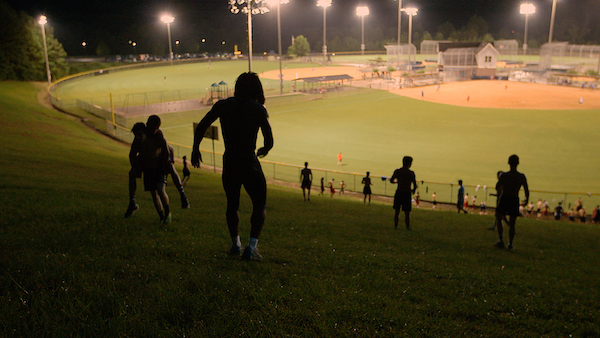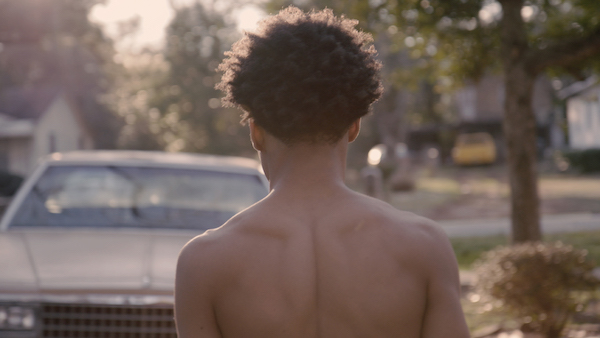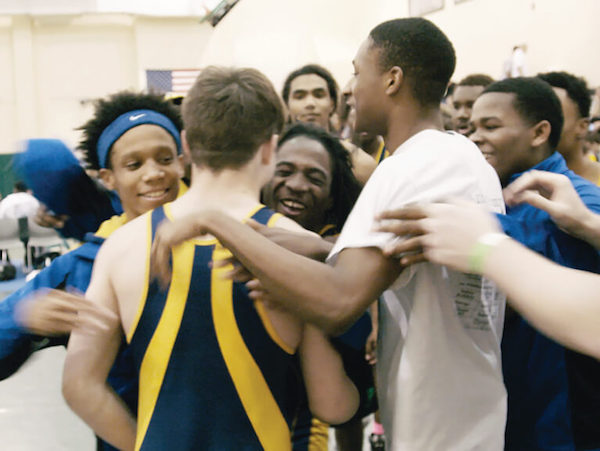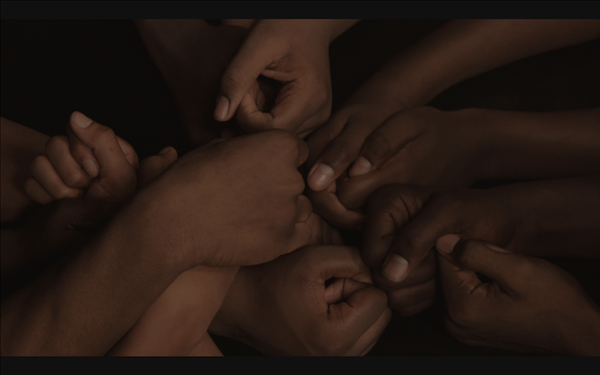Meet Suzannah Herbert and Lauren Belfer, director and co-director of Wrestle, which makes its New York Premiere at Rooftop Films on Friday, June 8th. The film documents the experiences and struggles of the J.O. Johnson High School wrestling team with intimacy, nuance, and the empathy all-too-infrequently seen in nonfiction filmmaking. We spoke with Herbert and Belfer before their premiere about building trust with documentary subjects and telling stories about the South.
***

How did you find out about the Wrestling Team in J.O. Johnson High School and what was it about the team that sparked your interest in filming them?
SUZANNAH HERBERT: I heard about the Johnson wrestling team while looking for stories to tell in the South, where I’m from. The wrestling team at J.O. Johnson High School had gotten some local coverage because the wrestlers were new to the sport, and yet they were defeating kids who had been wrestling since they were five. Plus, Johnson had been on Alabama’s list of failing schools for years and was slated to close at the end of the school year. So, from the beginning, I knew that the young wrestlers were fighting against a lot of odds, and there could be a great story of their road to the Alabama State Championships. That said, it was really when I met the individual wrestlers that I felt passionate about documenting the season and – most importantly – their lives outside of wrestling.
Throughout shooting, the protagonists find themselves in situations that are at the center of national conversations. Were you surprised by the frequency and intensity of these interactions?
SH: It was more sobering than surprising. Intellectually, I know that African Americans and minorities are stopped by police at a much higher rate than whites, but to witness and film racial profiling and racism in real time brought this reality to a new level. I want audiences to feel from the point of view of our protagonists just how terrifying, unjust, and precarious being a young black teenager in America can be. I hope audiences will have an emotional connection to the “stat” and actually feel this injustice enough to do something that will make a difference.
LAUREN BELFER: I hope, too, that by showing how little it takes for these high school students to be detained by law enforcement, minority viewers — who may have endured similar situations themselves — can also experience some vindication in having these moments of injustice shown on screen. It would be impossible to tell this story without acknowledging how common and unjustified these incidents truly are.

You captured moments of raw emotion and anger at spontaneous moments through the documentary, how did you get the team so comfortable with the camera and film team so as to be able to exhibit so much emotion on camera?
SH: We made a decision before the season started that our cinematographer, Sinisa Kukic, and I would live in Huntsville. We didn’t want to be in and out of their lives. Trust is built by showing up, so it was important to us and the process that we would be there for every practice, every tournament, every outing. After a few weeks, it really felt like we were part of the team, mainly because they were so accepting and welcoming. I also think we were able to capture so much emotion on camera because we were there for all the “boring” stuff as well. We spent hours filming the wrestlers practicing, playing video games, cleaning, doing homework, sitting around, hanging out with their families, so when intense, hard things actually did happen, it wasn’t weird or uncomfortable for us to be there. Being able to capture the moments of raw sadness, fear, anger, happiness, is really a testament to the kids and their families. They were courageous in letting us into their lives and trusting in the idea that their stories could have wide-reaching significance.
LB: It’s also about the willingness to invest your own time as a filmmaker, and as an individual. For all the time spent filming the quiet moments, there was also a lot of time spent hanging out with the team just as ourselves, when we wouldn’t record anything. Getting to know each other off-camera allowed us all to build relationships in a more natural, genuine way. Ours is an intimate film, and though the approach is verite, we can’t pretend that we were mere “flies on the wall” during production. The film is incredibly honest, but it would be misleading to suggest that our perspectives are impartial; we’re invested in each wrestler’s success and hope we’ve presented their stories so that audiences feel the same.
Place is so central to Wrestle, but the story is universal. Suzannah, what do you think stories from the South convey about the United States and how do you think we can get more stories from the region out into the nation and world?
SH: In the South, the history of our country is palpable. There’s this somewhat tragic beauty in the contrast between and entanglement of the past and present. It’s important to understand the South and its people and struggles because I think it’s a reflection of the greater American condition and vast amount of work we all have to do on the road and fight towards equality and freedom.
I feel it’s essential to get more stories from the South out into the country and world, and for the people with resources and privilege to trust and invest in female filmmakers, as well as minority and LGBTQ filmmakers. We were so lucky that our Executive Producer, Micheline Levine, connected us with producers Steven Klein, Seth Gordon, and Mary Rolich, who all invested their resources and time into first time filmmakers they had never met. It helps a lot when people who are established lend their guidance and resources to female and minority filmmakers. ‘Wrestle’ would not exist without their support.

Towards the end of Wrestle we draw a close to the main storyline of the state championship, although simultaneously the young men’s lives were just beginning , how did you know when to your story was complete?
SH: We very intentionally wanted to end on a question and leave the audience with the somewhat uncomfortable realization that their adult lives are just now beginning, and even though they are amazing young men, their lives may not work out in ways we hope for them. Have we as a society prepared them for adulthood? Are our systems in place going to lift them up or suppress their potential? After watching only the last year of their lives unfold on screen, the answer to these questions is pretty frightening, and it is clear the struggles our young heroes face are tremendous and are not going to stop just because they are now 18.
LB: It’s an especially rough blow because, though the film is small in scope, the questions it poses are overwhelming. And we don’t endeavor to suggest solutions. More than anything, our goal has always been to help people see that the conversation itself is urgent and necessary. Why are the experiences of these young men so much more difficult compared to the average high school experiences we see depicted on screen? And, are we willing to live with the knowledge that these difficulties stem from biases and disadvantages due to race and class? Suzannah and I are not, and this film is our attempt to make others confront these essential, if uncomfortable, questions for themselves.

***